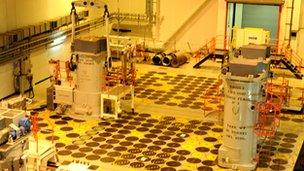Nuclear waste disposal: Where in Cumbria to bury it?
- Published
A proposed underground store for high level nuclear waste in Cumbria is proving to be controversial.
Arguments over nuclear waste disposal have been raging for decades, especially in Cumbria where the search continues for a site suitable for storing waste for tens of thousands of years.
Nuclear and scientific experts disagree about geological issues and, combined with Cumbrian public concerns at having an underground repository for nuclear waste, the dilemma continues.
Cumbria has volunteered to consider housing waste in the county - and nationally, it is currently the only option.
But experts say the way in which site selection is being carried out is wrong.
Tourism fear
Britain needs to find a site for long-term underground storage for high level nuclear waste, as some of the spent fuel from the Sellafield nuclear plant will remain dangerous for up to 100,000 years.
Part of West Cumbria was investigated for an underground nuclear waste laboratory in the 1990s in what was called the Nirex Plan, but a planning inspector ruled that the geology was unsafe.
Alun Ellis, from the Nuclear Decommissioning Authority (NDA), said: "That doesn't mean that we might not be able, if everything goes well with the planning process, to find a suitable site in Cumbria."
Cumbria County Council, along with the authorities in Allerdale and Copeland, is demanding clarification on what the community benefits to Cumbria might be, along with guarantees of money to promote the county and protect its image.
Although nowhere in Cumbria has been ruled out, two highly sensitive areas, that could be investigated further, have now been identified by one geologist.
These are Eskdale in the South West Lakes and Silloth in the North Lakes areas.
Andy Brown, a local outdoor pursuits instructor said: "I am worried... we run businesses based on tourism.
"There may be thousands of employees at Sellafield but there are thousands of people who live through the tourist industry in Cumbria."
John Rowlands, of Romar Innovate in Whitehaven, feels more positive about the development.
"The nuclear industry has worked alongside tourism for as long as I can remember," he said.
"We've had waste stores at Sellafield before and it hasn't affected the industry."
£20bn bill
The government's agreed solution to the storage question is to bury the nuclear waste.
Engineers who have assessed the project to build deep underground storage facilities feel it would be a bigger construction challenge than that of the channel tunnel, with tunnelling between 200 and 1,000 metres.
About 1,000 construction workers would take an estimated 15 years to complete it at a projected cost of between £12bn and £20bn.
The Department of Energy and Climate Change is committed to the process of site selection being to establish a list of volunteer communities followed by testing the feasibility of each site's geology.
The department said that not to adopt this process would "risk repeating the failed approach taken by Nirex in the 1990s".
Government minister Baroness Verma said: "Voluntarism lies at the heart of the government policy for a long-term radioactive waste disposal solution.
"It would be unjustified to carry out expensive and speculative geological assessments before a community had volunteered."
'Wrong way round'
Dr Keith Baverstock is a former government adviser for the nuclear industry.
He was fired from the panel of advisers in 2005 after raising concerns about the scientific process in looking for waste solutions.

The safety of long term storage is paramount
He told BBC's Inside Out programme: "This process of voluntarism seems to me to be ludicrous.
"You need to know when you ask people whether you can bury your radioactive waste in their back gardens, whether it's feasible to actually do it.
"It's the wrong way round," he insisted.
Former Nirex inspector, Chris McDonald, also criticised the current plans.
He said: "I was very surprised to find that West Cumbria was being floated once more as a potential site.
"I think the probability of their finding a suitable site is low."
Last week, the three councils concerned asked the government for more time to consider their options.
They are also insisting on a legally binding agreement to be able to halt the process at any stage before the diggers move in.
After years of debating the councils were due to reach a decision on pulling out or to progress with plans on 11 October.
Instead the vital meetings will not now take place until early 2013.
Cumbria's Nuclear Future: an Inside Out Special is on BBC One North East & Cumbria and North West on Monday, 8 October at 19:30 BST. It will then be available nationwide for seven days on BBC iPlayer.
- Published2 October 2012
- Published4 March 2012
- Published7 June 2012
- Published12 September 2012
- Published23 December 2011